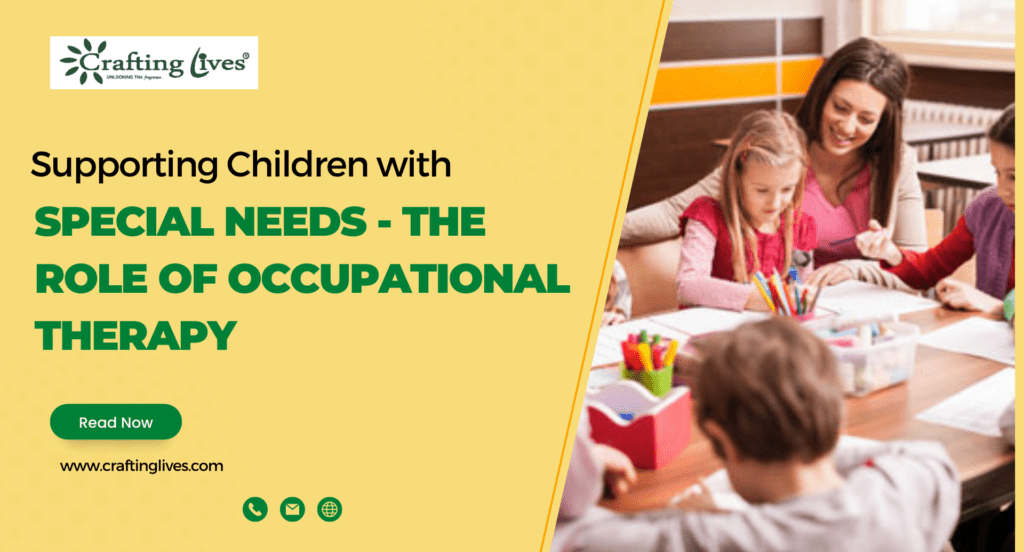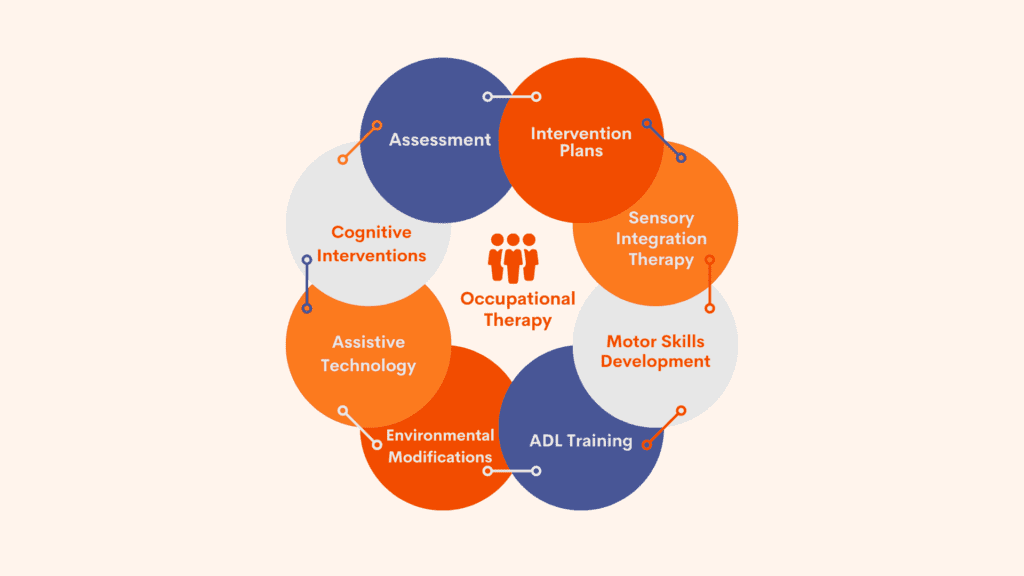
Occupational therapy is a vital and multifaceted profession that plays a crucial role in supporting children with special needs. Occupational therapists work with children with special needs to help them develop the skills and abilities they need to thrive in their daily lives. They provide interventions that promote their overall development and well-being.
Children with special needs, including those with disabilities or developmental delays, require specialized care and support to thrive in their daily lives. Occupational therapy is a vital component of the interdisciplinary approach to addressing the unique needs of these children. In this blog post, we will explore the role of occupational therapy in supporting children with special needs.
Understanding Occupational Therapy for Children with Special Needs:
Occupational therapy promotes meaningful activities and functional abilities for children with special needs. Here are some key aspects of occupational therapy for children with special needs:

1. Assessment: Occupational therapists rely on assessment to evaluate a child’s strengths and limitations. This evaluation is crucial in developing a tailored intervention plan that targets the child’s specific needs and objectives. Occupational therapists conduct thorough assessments to understand the child’s strengths, weaknesses, and functional abilities. This may include evaluating their sensory processing skills, motor skills, self-care skills, cognitive abilities, and play skills.
2. Individualized intervention plans: Occupational therapists develop individualized intervention plans based on the child’s unique needs and goals. Sensory integration therapy, motor skills development, ADL training, environmental modifications, assistive technology, cognitive interventions, and play/leisure participation.
3. Sensory integration therapy: Sensory integration therapy is a core component of occupational therapy for children with sensory processing issues. Occupational therapists use sensory-rich activities to help children regulate their sensory responses, improve sensory processing skills, and promote self-regulation.
Sensory integration therapy helps children with sensory processing issues develop appropriate sensory processing skills and self-regulation abilities. This promotes functional abilities, enabling their full participation in daily activities.
4. Motor skills development: Occupational therapists employ diverse activities to enhance children’s fine motor skills, including tasks like handwriting, buttoning, zipping, cutting, and manipulating small objects.
5. ADL training: Occupational therapists help children with special needs develop self-care skills to promote their independence, functional abilities, and overall quality of life. They use an individualized approach, adaptive strategies, skill development, environmental modifications, caregiver involvement, and goal-oriented approach to ensure progress.
6. Environmental modifications: Occupational therapists may recommend changes to the child’s surroundings. This can include alterations to the physical layout, seating, lighting, and sensory supports, aiming to enhance accessibility and promote the child’s well-being.
7. Assistive technology: Therapists adopt a client-centered and collaborative approach to empower children with special needs and their families. They work together to effectively utilize assistive technology, enabling the children to achieve their goals and participate fully in daily activities.
8. Cognitive interventions:
Occupational therapists employ a holistic and individualized approach to support cognitive development in children with special needs. They target cognitive skills, including attention, memory, problem-solving, and executive functioning, to promote overall cognitive growth.
9. Play and leisure participation: we promote inclusive play and leisure opportunities for children with special needs to support their socialization, creativity, and self-expression. They create inclusive play environments, collaborate with peers, involve parents and caregivers, and facilitate community-based leisure participation.
Collaborative Approach:
Occupational therapy for children with special needs follows a collaborative approach that involves the child, their family, and other professionals. Therapists work in coordination with other healthcare providers to provide comprehensive care and address the complex needs of the child.
Effective communication, coordination, and teamwork among all stakeholders are crucial for the success of occupational therapy interventions. By working together, a cohesive and holistic approach can be achieved to optimize the outcomes for children with special needs.
Empowerment and Advocacy:
Furthermore, occupational therapists also serve as advocates for children with special needs. They actively promote their rights, inclusion, and access to opportunities. Through their expertise, occupational therapists assist children with special needs in developing skills and abilities that foster independence, self-sufficiency, and active participation in their communities. With their support, children with special needs can overcome challenges and achieve their fullest potential.
Conclusion
Occupational therapy is essential for supporting children with special needs. It provides comprehensive care and empowers them to reach their highest potential. The therapy involves assessing and intervening in various areas. These areas include sensory processing, motor skills, self-care, environmental modifications, assistive technology, cognitive interventions, and play/leisure participation.
Occupational therapy promotes independence, self-sufficiency, and inclusion for children with special needs. It empowers them to fully participate in their daily lives.
Through a holistic and individualized approach, it can make a positive impact on their development and well-being.
If you have a child with special needs, it is worth considering occupational therapy as part of their care plan. Consulting with a qualified occupational therapist can help you better understand your child’s unique needs and explore how occupational therapy can support their growth and development. By implementing the right interventions and providing appropriate support, children with special needs can thrive and lead fulfilling lives.
Crafting Lives is one of the Best Child Therapy Centre in Indirapuram, Ghaziabad. Additionally, the center in Indirapuram started with modest beginnings in 2015. Despite the challenges posed by the pandemic, the center has consistently provided one-on-one therapies related to autism and special education. Furthermore, the center has strived to deliver the best quality of therapies to the children with special needs (CSN).
Some relevant places to find OT tools and toys are https://www.theottoolbox.com/the-ultimate-guide-to-occupational-therapy-toys/ https://www.amazon.in/occupational-therapy-toys/s?k=occupational+therapy+toys


Great Insight! 👍👍👍👍👍👍👍👍👍 Want to know what kind of activity can be helpful from an occupational therapy point of view!? Can you share more detail on this?
Very nice explaination 👍👍 It will be helful for the parents